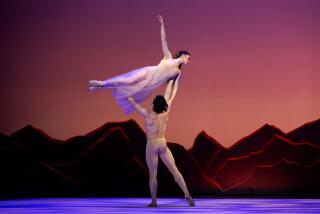TV REVIEW : An Authentic ‘Queen of Spades’
- Share via
Lots of things are changing in Russia these days. Even operatic staging techniques. One wouldn’t guess it, however, from the Kirov performance of “Pikovaya Dama,” a.k.a. “The Queen of Spades,” telecast on Bravo tonight (5:30 and 10:30).
This is a lavish demonstration of innocent, old-fashioned spectacle. The storytelling takes nothing for granted. The stagy-literal action keeps stopping so the singers can pose, stagger and lurch in predictable, time-dishonored ways, and most of the singers do what is expected with disarming conviction. Cultural pride, tradition and all that. . . .
Tchaikovsky’s melodramatic setting of Pushkin’s brooding poem received its premiere at the Maryinsky Theater in St. Petersburg in 1890. The current edition, filmed by the same company in the same house last year, cannot be drastically different.
The credits do not reveal the age of the production. It was directed, with reverential conservatism, by the sometimes eccentric conductor Yuri Temirkanov, who ran the Kirov Opera from 1977 to 1988. “Pikovaya Dama” is now conducted, with sweeping bravado, by Valery Gergiev, a less mannered maestro with far more progressive inclinations. The ballet divertissement , credited to none less than Oleg Vinogradov, looks just as silly as opera ballets everywhere.
It would be a mistake to hope for revelations here. It would be unrewarding to expect much inspiration, beyond Gergiev’s vital contribution. Still, one can admire the authoritative style, even when it is routinely projected.
The cast is dominated by the Gherman of Gegham Grigorian, whose burly tenor and stiff demeanor are remembered from appearances in Los Angeles with the Yerevan Opera in 1989. Maria Guleghina, a problematic Tosca in San Francisco last year, partners him as a reasonably impassioned, bright-toned Lisa. Ludmilla Filatova sounds prettier than necessary and looks much too young, far too benign as the formidable old Countess.
The supporting cast includes Olga Borodina, a mezzo-soprano whose star is rising fast in the East, and Sergei Leiferkus, character-baritone par elegance already admired in San Francisco and at the Met. It should be noted, incidentally, that definitive assessment of the singing was compromised for this listener by mechanical problems. The sound on the videotape provided for review ranged from dim to abominable.
The lengthy telecast, directed by Brian Large, begins with a lovely little travelogue of an unusually sunny St. Petersburg. It ends with an engaging view of curtain-call manners behind what used to be an iron curtain. Subtitles appear on a nasty little black strip that constantly blocks the picture at the bottom of the screen.
More to Read
The biggest entertainment stories
Get our big stories about Hollywood, film, television, music, arts, culture and more right in your inbox as soon as they publish.
You may occasionally receive promotional content from the Los Angeles Times.










